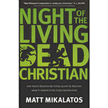
The Christmas tree I set up
every year in my office at work
I've been doing some thinking about Christmas.
I know that seems like a kind of weird thing to say... hasn't
everybody been thinking about Christmas? This time of year it's all around us. There are trees and carols about Jesus and songs about Santa and gift shopping and
cartoons about Charlie Brown and people angry about the word "Xmas" and the phrase "Happy Holidays," and church Christmas programs and
missions offerings, and
people generously paying off other people's layaway accounts and
buying gifts for children from poor families, and traveling and Christmas parties and white elephant exchanges and who knows what all else. And always, always,
always there is someone telling us about the "true meaning of Christmas." In fact, that phrase has started sounding a bit ludicrous to me this year, like something people just say. Like when I say, "How are you?" as a greeting, and you say "Fine," even when you're not really fine. It's just what you say. And I'm starting to think that this time of year, people talk a lot about the "meaning of Christmas" without really putting much thought into what they're talking about.
This week I listened to some podcast sermons from a local church where the pastor started out from the premise that society is "trying to take Christ out of Christmas." He mentioned the recent debates over the use of "Happy Holidays" instead of "Merry Christmas," and the notion that was popular several years ago that using the word "Xmas" is the same as "X-ing God out of Christmas." He acknowledged that the "X" represents the Greek letter "Chi" which is an abbreviation for "Christos" which is Greek for "Christ," but then paradoxically proceeded as though he thinks people are using the X to remove Christ from the picture anyway. After that confusing start, he talked about what it would be like in the world if Jesus hadn't been born. He mentioned some of the charitable organizations started by Christians (the Salvation Army, for example, and the YMCA) and people who have done great things because of their faith in Christ (Mother Theresa, monks and scribes who preserved ancient manuscripts, missionaries who helped and still help non-literate people groups develop written language). His message was stirring, but it leaves you with the idea that unless Jesus had come, the world would be totally devoid of any of those things.
I just don't buy that. It's not like God had no hand in the world at all before He sent His Son down so God could finally have a say in what was going on down here. God has always been active in His creation; all through the Old Testament you see God intervening, and if you read it carefully, you'll realize that the descendants of Abraham were intended to be God's instrument of doing good in the world all along (
God even refers to Israel as His "firstborn son" in a place or two!) I agree with Pastor that Jesus' coming and the rise of Christianity has had a huge impact on mankind, but the picture you wind up with is one of a world devoid of anything holy or good, with no philanthropy or kindness or Cyrillic alphabet or orphanages or anything. Based on my reading of the Old Testament, I believe that if God's plan had not included sending His Son into the World, God would have instead used the Jewish nation to do all of those things. The job would not likely have been done in exactly the same way, but I believe God would have made it happen somehow. Because God loves people.
And if you're going to hang the "meaning of Christmas" on the nice things people have done in the name of Christ, what are you going to do with the
evil things people have done in Christ's name? What about "holy wars" and Crusades? What about priests raping children and parents browbeating their families with the Bible? What about Protestant/Catholic wars in Ireland? What about alleged witches being burned at the stake? What about weird stories like the tale of William Tyndale, who was executed by the religious authorities (in God's name) for translating the Bible into English (in God's name)? If Jesus hadn't come into the world, those things might not have happened, either. I don't think Christmas is a time for patting ourselves on the back, talking about how nice we are to people because Jesus made us act nice. I don't belittle the transforming power of Jesus Christ in the life of someone who follows Him; in fact, I depend on it. Without it, I would be a mess. But I don't think the "meaning of Christmas" is that Jesus makes us nicer.
Then I read
this terrific blog post by a pastor who has become fed up with the consumerism of the Christmas season, seeing it as something that brings harm to us rather than good. I mean, when you come out of Christmas with debt you wouldn't have had otherwise, that's a bad thing. When you spend the whole month of December selfishly thinking about what you hope people will give you for Christmas, that's a questionable use of your time, especially if the end result is going to be disappointment or even anger if you didn't get what you wanted. Pastor Sammy makes some very important points about the attitude we should have about Christmas, but he seems to have reached a point where he's almost ready to throw out the baby with the bath water (not the Baby... I didn't mean Jesus. Stay with me on this, now!) Although I do agree with him that when we buy expensive things we can't really afford and then say it's because of Jesus, we do the essence of the story about Jesus' birth a disservice. And I want to make it clear that I understand (and you should understand, too) that when Pastor Sammy said "I hate Christmas" he didn't mean it in the sense that he thinks it should be eliminated; he was stating his case in a shocking way to get people's attention. Make sure you read his followup blog post (link at the bottom of the original) so you understand clearly where he's coming from. I agree with him particularly about doing consumer-y things in the name of Christ; I have a relative who was so turned off by that sort of thing that he essentially abandoned Christmas (and God) altogether. But I think there's a balance to the season that we need to strike.
Mariah Carey's Christmas album "
Merry Christmas" is one of my all-time favorite Christmas albums. And listen, I have TONS of Christmas albums. I have a collection of maybe a couple hundred, both religious and non-religious. I like Mariah's in large part because it is actually far more reverent and Christ-centered than most of the "Gospel" Christmas albums I've heard. Who would have thought you'd hear a song called "Jesus, What A Wonderful Child" on a pop Christmas album? That song alone has the word "Jesus" in it more times than most entire Gospel albums. Her "O Holy Night" has got to be one of the most amazing arrangements/performances of that song ever. And when I hear a song on a pop singer's Christmas album end by repeating three times the phrase "He is light, He is love, He is grace, born on Christmas day," I can't help but be astounded at the guts it must have taken to record something with that amount of religious significance. That line alone could be the basis of a pastor's entire Christmas sermon! But you know what? Mariah wasn't afraid to follow up "Silent Night" with the love song "All I Want For Christmas Is You," and then to follow up "O Holy Night" with "Christmas (Baby Please Come Home)". And she also wasn't afraid to include her fun take on "Santa Claus Is Comin' To Town" right after that whole thing about light, love, and grace. So the real question is: has Mariah devalued the significance of the religious content of her album by including things about missing someone you love, wanting to be with them, or a Jolly Old Elf?
Balance.
I don't think there is a "meaning of Christmas." I mean, I think it means different things to different people, and it means different things to the same person at different times. I imagine it means something different to Mariah when she's singing "I miss you most at Christmas time, and I can't get you off my mind" than it does when she's singing "Jesus, born on this day, He is our Lord and our Savior." It means something different to me when I'm listening to Linus talk about the shepherds keeping watch over their flocks by night than it does when I'm watching my kids open their presents. The Christmas season, with all of our traditions and habits and history, is a complex thing, and you can't wrap it up in a pretty box and slip it under the tree. It's just not that small of a thing.
But I will tell you my favorite thing about Christmas, and yes... it's a "Jesus thing." The thing I love most about Christmas is that at Christmastime, people are more likely to act like Jesus intended for them to act. People are nicer to each other. People wish each other well - I don't care if they're wishing you well just on Christmas, or on the many holidays that occur in and around the month of December. And at Christmastime, it "feels" more "okay" to talk about Jesus. It's a time when it's easier to share your faith - don't browbeat with it, but
share it, like a Christmas present that can be accepted or rejected by the recipient. But don't self-righteously deny people their gift-giving and their Jingle Bell Rock and the other trappings of the season. It's not an affront to God that you have a tree in your living room, whether or not the history has something to do with pagans in the woods. Jesus was not born on December 25th; probably not even in the month of December. If you're looking for a "meaning of Christmas," then Christmas essentially means that we have a few days off from work, give each other presents, sing traditional songs, that sort of thing. It's a festival. But I think we can adopt a new question: what is the
opportunity of Christmas? Everybody knows the story of the sweet little baby who was laid in a manger because there was no room in the inn, and if they don't, there are a billion shows on TV to tell that story. The opportunity we have at Christmas is to experience that story one more time, and maybe start a dialog about it with someone who doesn't understand that the real gift was not the baby, but the redemption He provided when He died on a cross thirty some-odd years later.
Have fun this Christmas! Sing carols, visit with family, enjoy your candlelight service, open your presents. I hope you have great stuff in your stocking Christmas morning. But you don't have to search for a "meaning" to Christmas, because it means whatever it means to you at any given moment. But remember the
opportunity of Christmas... which is essentially the same opportunity Christians have all year long. The opportunity of Christmas is to remember that the baby whose birth we are celebrating grew up to love people, help the poor and sick, share God's message of hope, and ultimately give Himself for us... and then the opportunity is to allow Him to transform us so that we live more like He did every day of the year.






